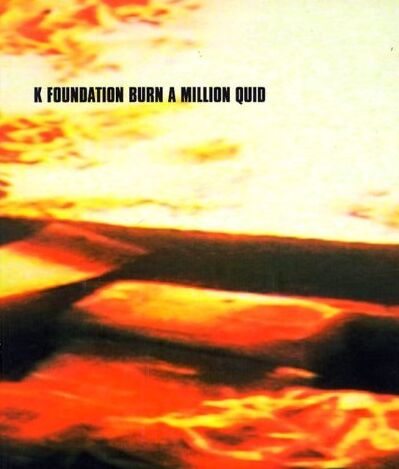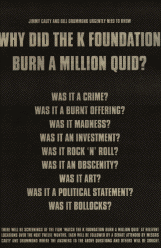K Foundation Burn a Million Quid
Chris Brook and Gimpo (1997)

[Chris Brook:] Although the K Foundation were not a "real" art foundation, their financial assets were very real. The money had accrued from a previous Jimmy Cauty and Bill Drummond project in pop music—the KLF.
On 22 August 1994, Cauty and Drummond travelled to the island of Jura off the west coast of Scotland with a suitcase containing £1 million in new £50 notes. Accompanying them were Gimpo, a long-time colleague, and Jim Reid, a journalist who had been commission to write the catalogue for Money: A Major Body of Cash.
In the early hours of 23 August, in a derelict boat house on the coast of Jura, Cauty and Drummond began to burn the money. Gimpo was handed a Hi-8 video camera and asked to film the event. the £1 million took 55 minutes to burn and the ashes were swept up and returned to the suitcase.
This book sets out to explore that act. (5)
[Timeline] August 1994 The K Foundation meet Anthony Reynolds, who suggests that they do not burn the £1 million but sell the right to burn the money to someone else. The buyer would not be allowed to touch the £1 million since all that would be bought is the dilemma: to keep the money and look at it, or burn it. The K Foundation reject this suggestion. (11)
[Gimpo:] I managed to get a fifty-grand pack—it was all in bundles of £50,000, shrink-wrapped in plastic—to the back of the room, not far from the car. They were too busy putting the money on the flames, anyway; I was behind the camera in the dark and I was thinking, Well, they're mates and everything but they're only going to burn it . . . I could put the pack in the boot under the spare wheel where they couldn't see it and it would get me half a house in London. But then I thought, What about the other half? . . . should I go back and get another pack? . . . then I'll need a care . . . Where does it stop? And I thought if we were back in London and I had half a house or something, they'd know and I wouldn't be able to see them again. So I just didn't bother. I sneaked back round and pushed the pack in the fire with my foot. It was all over in 40 seconds. I left the camera there so Jim Reid wouldn't nick any. If I couldn't nick any he wasn't going to. He asked if he could keep a note as proof, but Jimmy said no. It had to be a million they burnt—I could understand that. (14-15)
Bill Drummond: You still haven't answered the question: "What was that money?"
Audience member: I think I have: what you burnt was proceeds which represent the resources that you have burnt.
Drummond: What resources have we destroyed? What is there less of in the world? Are there fewer loaves of bread of grains of rice in the world because that much paper doesn't exist anymore? (18)

Audience member: Is it not a criminal offence to burn it?
Drummond: It's a criminal offence to tear it, scribble on it; put holes in it; but it isn't a criminal offence to burn it. They never thought to make a law against it; they never thought people would be that stupid. (18)
[Osman Eralp:] Bill and Jimmy burning a million is somehow a negation of [the post-modern world philosophy]. I'm glad they chose in the final hour not to publicise it, thought no doubt later they will. They have robbed post-modernism by turning it on its head—taking the one thing post-modernism would have wanted from the burning, which would have been to make something "interesting" out of the project. (40)
[Anonymous:] It's like burning people's dreams in front of them. A really rotten act. (42)
[Anonymous:] Do you assume a right to make others think? (49)
[Lionel Martin, Martin, Greene, Ravden, Accounts:] They came in and asked for £1 million of their own money, which we could all see from the bank statements they had. Simple request you might . . . I did, but it wasn't until I rang the bank that I realised how difficult it was to get your hands on your own money. (60)
[Anonymous:] In watching it I could lose myself completely and revel in the delight of the cleverest, loudest, most brilliant and, by far, the most eloquent "fuck off" ever manifested. (84)
[Anonymous:] You will go to your graves known as the men who burnt £1 million, just as Divine was known as the man who ate dog shit. (86)
[Anonymous:] I hope that your plans for the future include something that all your admirers can participate in—i.e., a product we can buy. (88)
[Anonymous:] Rockefeller isn't getting kicks out of every million he's got as you are with yours. (98)
[Anonymous:] I doubt if you will find two individuals like yourselves on this planet of around four billion who could have carried out burning £1 million. (102)
[Anonymous:] You've really blown your credibility with this. (106)
[Tina Küürb, London:] You posturing, idiotic eternal adolescents. Get some sort of life—one that isn't continually looking for big anti-hero applause. The art-school dance ended years ago, and you're beginning to look like the janitors. (108)
Audience member: Did you get value for money?
Jimmy Cauty: We don't know what we've bought yet, we're still waiting to find out.
Bill Drummond: We have bought something: we've bought the burning of £1 million. That's what now exists that couldn't exist before. Whatever people get from that is what they want to get—but it cost £1 million. (124)
Audience member: Why not go and burn the Houses of Parliament? Why not the UN building?
Drummond: Why don't you go and do it? We've done our bit. If you think the Houses of Parliament need burning, go and burn them. Why don't you go and burn them? (132, 134)
[Man at Ferens Gallery, Hull:] This is a scratch card that I've framed. I'm skint, I've got a kid, I've got a wife and I've not got a job. Sometimes I look at this and think what if I've won? But I want to keep it like this. Maybe I'm looking at £10,000 quid, but I'll never know and I'm kind of proud of it. (146)
[Gimpo:] Then Bill said to me, "Have you ever seen a truck go off a cliff before?" I said, "No" and he said, "Well . . . " and I couldn't argue any more. (160)
[Anonymous:] You just want us to talk about stuff now, but it's just irrelevant, I don't care. (166)
[Greil Marcus in Lipstick Traces, 1989, explaining the origins of the name of Guy Debord's magazine Potlatch:] Potlatch was the name, used among the Indians of North America, of a pre-commercial form of the circulation of goods, founded on the reciprocity of sumptuary gifts; the non-saleable goods such a free bulletin can distribute are previously unpublished desires and questions, and only their thorough analysis by others can constitute a return gift. (174)
[David Bowie, singer:] I caught the last 20 minutes of it. I found it very confusing. (182)
[Kevin Hull, BBC producer:] The art world is very wary of which pop people it allows in. So you end up with David Bowie's ridiculous paintings being taken seriously, but this . . . a beautiful act like this, is treated with disdain. (192)
["Mistress of Kitsch," Brighton:] I saw Elvis's face in the flames. (202)
Bill Drummond: Somebody said to us that because Yves Klein in the fifties threw gold into the Seine, all you're doing . . . because Klein had done that and sold the concept of him doing that . . . that what we were doing was exactly the same, so from an art point of view it was null and void. So, does anybody think that because Yves Klein did what he did we shouldn't have done what we did?
Audience member: But Yves Klein didn't do it with his own money, he did it with other people's money; he got people to buy that gold off him and then they would throw it together into the void—they got a recept. It was an act with a person. You should have sold your money first.
Jimmy Cauty: We made a mistake then! (212)
Bill Drummond (on the letter K): It's the strongest sounding letter in the alphabet by far. (216)
[Anonymous:] The antagonism here reveals an implication that if you'd spent a million on cocaine that would be fine; no one attacks Cher or Michael Jackson for millions spent on homes or videos. (222)
[Anonymous:] The right to create art information is the right to broadcast signals which assist/retard the evolution of the species. (224)
Bill Drummond: There's a part of us that would like it to be rock 'n' roll, but another part is annoyed that maybe that's all it is; that it's only rock 'n' roll—and when you get to our age you don't wanna be doing rock 'n' roll, you want to. . . .
Anthony Wilson: You want to what?
Drummond: Exactly! (226)
[Anonymous:] Your visit certainly carried some value even though it could never amount to £1 million. (234)
|



